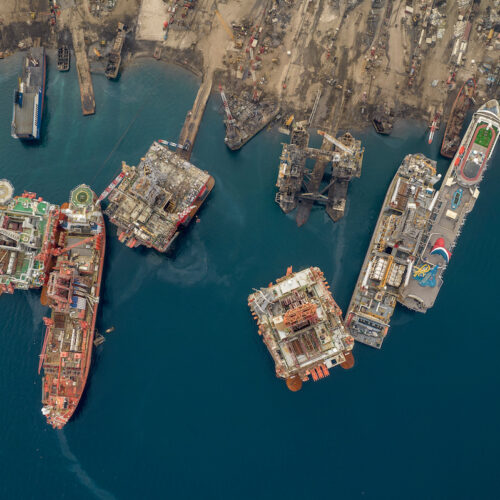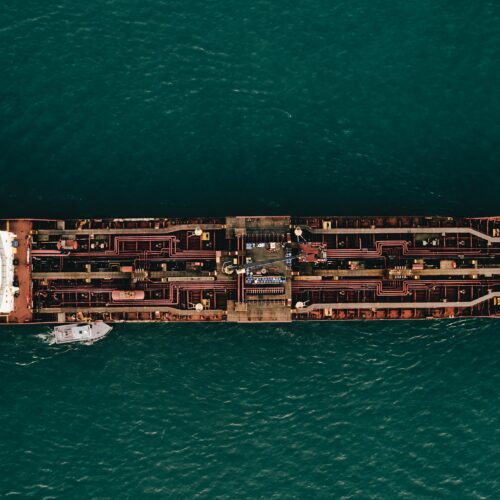Press Release – Dutch prosecutors press criminal charges against Seatrade
Managers risk prison sentences and hefty fines for the illegal sale of end-of-life ships
CORRECTION
Brussels, 15 February 2018 – Following discussions with the Dutch Public Prosecutor, cash buyer GMS was not confirmed to be the end-buyer of the Seatrade’s vessels. Evidence provided to the Court showed that GMS had made an offer for at least one of the ships, which supports the Prosecutor’s case on Seatrade’s intent to dispose of the vessel(s).
For the first time in Europe, Public Prosecutors are bringing criminal charges against a ship owner – Seatrade – for having sold vessels to scrap yards in countries “where current ship dismantling methods endanger the lives and health of workers and pollute the environment”. The case is being heard in a Rotterdam Court this week, and the Dutch Public Prosecutor calls for a hefty fine (2.55 mill EUR) and confiscation of the profits Seatrade made on the illegal sale of four ships, as well as a six month prison sentence for three of Seatrade’s top executives. Seatrade is based in Groningen, the Netherlands, and is the largest reefer operator in the world.
In 2013, the NGO Shipbreaking Platform had revealed Seatrade’s sale of the SPRING BEAR and SPRING BOB to respectively Indian and Bangladeshi breakers. The heavy charges pressed by the Dutch Prosecutor additionally involve the scrapping of the SPRING PANDA and SPRING DELI in Turkey, and are based on international laws governing the export of hazardous waste and the EU Waste Shipment Regulation. The Regulation prohibits EU Member States from exporting hazardous waste [1] to countries outside the OECD, as well as requiring a prior informed consent for such exports. All four vessels departed on their last voyage to the breaking yards from the ports of Rotterdam and Hamburg in the spring of 2012.
[The Prosecutor presented evidence that Seatrade was planning on selling the ships via a cash-buyer in order to maximize financial gain. In e-mail exchanges between Seatrade and Baltic Union Shipbrokers, cash buyer GMS offered the highest price for special parts of at least one of the vessels. The end-sale was not to GMS, but another undisclosed cash buyer.] According to the Prosecutor, Seatrade opted for using a cash buyer, rather than recycling the ships in a safe and clean manner, for purely financial reasons. [Cash buyers, such as GMS, are] infamous scrap-dealers specialized in bringing ships to the beaches of South Asia, where the price of end-of-life vessels is higher due to the exploitation of migrant laborers and to weak, or no, enforcement of safety and environmental standards. According to the Prosecutor, that Seatrade knowingly sold the vessels for dirty and dangerous breaking in order to maximize profits further aggravates the charge [2].
“Despite ongoing criminal investigations, Seatrade sold two more ships – the SINA and ELLAN – for dirty and dangerous breaking on the beach in Alang, India, in August 2017”, says Ingvild Jenssen, Founder and Director of the NGO Shipbreaking Platform. “This case adds itself to the growing demand, including from investors and major shipping banks, for better ship recycling practices”, she adds.
Authorities in Norway, Belgium, and the UK will be paying close attention to the verdict of the case. Similar cases are currently being investigated there, involving shipping companies such as Maersk and CMB, as well as the world’s largest cash-buyers GMS and Wirana.
NOTES
[1] Ships contain many substances that are toxic within their structure, including asbestos, heavy metals and residue oils. Since Seatrade specializes in transporting refrigerated goods, all the vessels additionally contained chlorofluorocarbon (CFCs), a substance which is known to cause ozone depletion in the upper atmosphere. The Montreal Protocol (on Substances that Deplete the Ozone Layer), which entered into force in 1989, has since its adoption phased out and prohibited the use of CFCs.
[2] Earlier this year the world largest private investor, the Norwegian Oil Pension Fund, divested from four shipping companies due to their poor shipbreaking practices. They also argued that selling a vessel to a beaching yard “is a consequence of an active choice on the part of the company that owned the vessel to maximise its profit”.
Related news

Ship recycling in Aliağa under the spotlight
NGOs call on Turkey and the EU to bring needed change and transition the sector towards dry docks.
... Read More
Platform News – Violence reaches new level: shipbreaking yard’s private security personnel fire shots and injure seven people
In the morning of 28 March, shipbreaking worker Sumon was killed on a private road inside Kabir Steel yard located North of Bangladesh’s major port city, Chittagong…. Read More

Platform News – ECSA’s Alang report turns a blind eye on problems of beaching method
The European Community Shipowners’ Association’s (ECSA) has published a report on their visit to the Alang shipbreaking yards in India last April. The NGO Shipbreaking Platform criticises… Read More

Platform News – Turkish Civil Society Organisations take legal action to ensure Environmental Impact Assessment of the ship recycling sector in Aliağa
On 10 January 2024 a coalition of organisations, including Aegean Environment and Culture Platform (EGEÇEP), İzmir Bar Association, TMMOB Chamber of Architects, İzmir Medical Chamber, and eight… Read More

Platform News – Worker killed in yard breaking German-owned container ship “Viktoria Wulff”
On 4 December, worker Shah Jahan was killed on the spot at Arefin shipbreaking yard in Chittagong, Bangladesh, where German container ship “Viktoria Wulff” (IMO 9252101) is… Read More

Press Release – Seatrade reaches settlement with Dutch Public Prosecution Service
Dutch ship owner Seatrade has reached a settlement with the Dutch Public Prosecution Service following the illegal export of four ships to India, Bangladesh, and Turkey for… Read More

Press Release – UAE takes important steps towards sustainable ship recycling
Set to take effect from June 2025, UAE new legislation brings about a ban on the beaching and landing of UAE-flagged vessels as well as all foreign vessels leaving or transiting through UAE waters enroute to scrap yards.
... Read More
Press Release – Turning point: new tech and developments for a new future of ship recycling presented at the Lab
Stakeholders that are pioneering a new future for sustainable ship recycling gathered in Rotterdam at the NGO Shipbreaking Platform’s Ship Recycling Lab.
... Read More